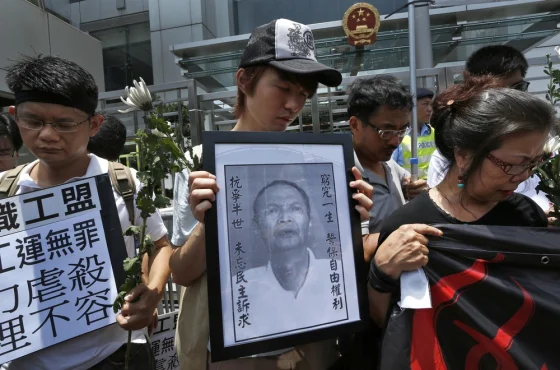Li Wangyang, a name etched into the history of China’s fight for democracy, became a symbol of resilience in the face of oppressive tyranny. His journey was shaped by tragedy, and his death—mysterious and controversial—has immortalized him as a martyr for the Tiananmen Square protests and the struggle for human rights in China.
Born on November 12, 1950, Li was a labor rights activist and a key figure in the Workers Autonomous Federation during the 1989 Tiananmen pro-democracy movement. As the chairman of the Shaoyang branch of the organization, Li was deeply involved in rallying workers and citizens to demand political reform. His voice was unwavering, calling for greater freedoms and justice in a country that stifled dissent. For his efforts, Li was arrested and sentenced to 21 years in prison—the longest sentence given to any activist related to the Tiananmen protests. He was charged with “counterrevolutionary propaganda and incitement” and later, “subversion.”
Li’s imprisonment did not break his spirit. For two decades, he endured brutal treatment, yet his resolve remained unshaken. Even in captivity, he continued to advocate for the victims of the Tiananmen massacre, refusing to be silenced. In 2011, after serving the longest prison sentence of any Tiananmen dissident, Li was released. But his release was not the end of his torment—it was merely the beginning of a darker chapter.
Just a year later, in June 2012, just days after a rare television interview in which he once again demanded justice for the Tiananmen victims, Li Wangyang was found dead in a hospital room. The Chinese authorities initially claimed it was suicide, but the surrounding circumstances and disturbing images of his body raised grave doubts. Later, they altered the official story to an “accidental death” following an autopsy, but the suspicion of foul play remained.
Li’s death sent shockwaves throughout Hong Kong and beyond. The news sparked widespread protests, with thousands of Hong Kong citizens marching in the streets to demand an independent investigation. In a city known for its political activism, the events surrounding Li’s death ignited the anger of both pro-democracy activists and more moderate voices, all united in their desire for accountability. The protests were a rare display of unity across Hong Kong’s political spectrum, with citizens of all backgrounds joining forces to demand answers.
Despite the Chinese government’s attempts to suppress and bury the truth, Li Wangyang’s legacy continues to inspire. His tragic death, shrouded in suspicion, has propelled his memory forward, transforming him into a martyr for the cause of freedom and democracy. His voice, once stifled by prison bars, lives on as a rallying cry for justice.
Li’s life and death stand as a testament to the enduring spirit of resistance in China. Though the Chinese government tried to silence him, Li Wangyang was born from death. His story serves as a reminder that the pursuit of truth, justice, and human rights cannot be extinguished, no matter how many years pass or how many voices are silenced. The fight for Tiananmen’s memory, for the victims of 1989, and for those still seeking freedom in China is far from over—thanks to the legacy of Li Wangyang.

